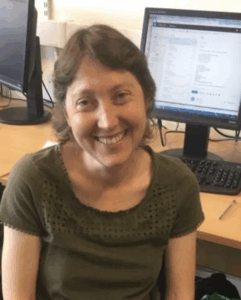
Janet’s story
After a decade of unanswered questions, Janet finally discovered she has Laryngeal mucous membrane plasmacytosis – a condition so rare she can no longer eat and survives entirely on intravenous nutrition. Through career changes, adapting daily life, and finding new passions, she’s built a life beyond her diagnosis. This is Janet’s story.
About me
I can’t eat. Nothing. How can I still be here to tell my story? My life changed dramatically 15 years ago. It started innocently enough with a throaty cough, then a hoarse voice, which then developed into repeated episodes of sudden muteness. I’m an occupational therapist, and none of this was great in a career which involves working with older people, often with hearing loss.
Around this same time, I moved into clinical research, and as part of this role I went away to a stroke conference to present some study findings. I was worried about my voice, and not prepared for something much worse – I choked on a pizza, and then repeatedly choked on every possible concoction of food. I hardly ate for the three days away. Tests revealed there were no muscle contractions in my oesophagus – there was simply nothing to push food down my gullet. The only option was to be fed artificially via a gastrostomy (a tube surgically inserted into my stomach).
Then my stomach stopped working. Tests confirmed dysmotility – basically nothing was moving down my gastric intestinal tract. There was no choice other than to surgically insert an intravenous line into my superior vena cava, the large vein that carries deoxygenated blood to the heart. By the miracle of science all my nutrition is now pumped from my heart around my blood stream, never entering the gastric tract (known as parenteral nutrition).
Impact on work
The immediate repercussion of being on parenteral nutrition was the need to be attached to an infusion for 16 hours a day. Disconnection of the infusion, around lunchtime, requires an aseptic technique, and lots of equipment. Not something that could realistically be accommodated in the office. It’s hardly comparable with having a sandwich!
Impact of COVID
However, this all happened around the time of the COVID lockdowns. Suddenly the world changed. Technology whizzed on. I, like everyone else, had access to online platforms for meetings. Something I could not have contemplated before COVID. I could work from home like anyone else, not singled out as different. When the lockdowns ended I was able to continue working from home, as did many of my colleagues.
Diagnosis
Although I was being treated for my symptoms the doctors remained baffled as to the underlying cause. I was passed from consultant to consultant. I had tests, tests, and more tests, in both Nottingham, where I live, and in London. These included biopsies but none brought me any nearer to a diagnosis. I was cautious therefore when my ENT consultant wanted to repeat the throat biopsies 10 years later. I agreed. Imagine my surprise when my consultant told me they had a diagnosis. Finally, the pathologist examining my biopsies that day had seen the condition once before. It was an incredible coincidence and an incredibly rare disease – Laryngeal mucous membrane plasmacytosis. But its rarity meant there were no answers, no solutions. The prolonged search for an elusive diagnosis resulted in nothing.
Impact on self
When my symptoms started I visualised my career crumbling. However, advances in technology, spurred on by COVID, softened my fall. I could still work as a researcher, albeit focusing on non-verbal tasks. My career did not completely stall. As an occupational therapist I know the true value of adapting activities, enabling those with disability to continue to fully engage in those activities most meaningful to them. I wanted to continue to work. It gave purpose and meaning to my life. Working in research enabled me to do this. Doing research is very different to working clinically. The latter you receive immediate rewards for your input. Patients in rehabilitation improve. They return home. As a therapist you feel you’ve made a difference. Research is less immediate. However, the impact you make is much wider. Instead of helping a handful of people as a therapist, through research you can reach hundreds, thousands, even millions.
My blueprint for life also had to change outside of work. My passion for hiking long distance trials, the latest the 192-mile Coast to Coast trial, had to give way to something less energetic. But I like a challenge, a goal to aspire after, and so instead of walking I opted for writing, and took on the National Novel Writing Month (NaNoWriMo) challenge – to write a 50,000-word manuscript in the month of November. I achieved the target, finished the novel, and was longlisted in a writing competition. I’ve not stopped writing since.
